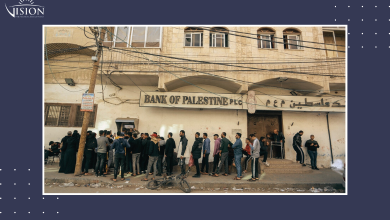Instability in the West Bank, Abraham Accords, and Biden’s Visit

Mohammed Hasan Darkhalil
Instability in the North of West Bank
Perlov and Dekel argued in “The Institute for National Security Studies”that the phenomenon of the increasingly frequent shooting incidents by young Palestinians including Fatah activists is areflect indication to the chaos within the Palestinian Authority (Udi Dekel, Orit Perlov , 2022). The Palestinian Authority is unable (or does not want) to control the North West Bank. They believe that chaos would be more obvious the day Abbas leaves his office.
However, to regain the PA’s authority in the North, the writers recommended that Israeli Government engages with Jordan and the USSC to empower the PA gradually. Furthermore, they recommend the Israeli government to focus on reconstructing the periphery and sponsor programs that include investment, employment centers, and building training for young Palestinians in the North, and this should be done by involving the Gulf and Jordan under the framework of the Palestinian Authority.
These actions are considered more dangerous because of them being initiated by Fatah activists, according to al-Awar and Tzoref. Fatah members cooperate with other armed factions, and attack Israeli Targets in North of West Bank. This means that; 1- Fatah is in lack of an internal central control, 2- Has an extreme division, and 3- these actions are steered by internal instructions. This maximizes Hamas’ ability to mobilize the street in the West Bank against PA and Fatah (Yohanan Tzoreff, Ali al-Awar, 2022). Ben Menachem believes that Abbas fears an outbreak of armed Intifada in the West Bank, and that his fear stems from him being assiduous to maintain his rule, as well as transferring his power to Hussein al-Sheikh in a smooth succession (Ben-Menachem, 2022).
Abraham Accords after Two Years
Feierstein and Guzansky, in an insight published by “Middle East Institute” argue that the participating governments in Abraham Accords view the agreement positively in the hope of advancing national interests, particularly when it comes to the private sector’s involvement and benefits (Gerald Feierstein, Yoel Guzansky, 2022) . Ben-Shabbat & Aaronson also considered the agreement as promising and optimistic after two years of cooperation and rapid progress in certain sectors;“Civilian spheres with great actual potential include a land trade route between Israel and the Gulf states; regional projects; energy, food, and water; digital health and medicine; and education and culture” ( Meir Ben-Shabbat, David Aaronson, 2022).
However, perceived insecurity of individuals weakens the probability of supporting normalization in the Arab World. Yet, a stronger civil society, growing tolerance, and a higher social trust can positively affect the normalization in the region. These results were concluded by Lindsay Benstead who studied the support of Arab countries for normalization after Abraham Accords. Her analysis started form the fact that roughly 20% of Arabs support the acceptance of Israel. She also concluded interesting findings that a stronger global connectivity through social media is associated with higher possibility to reconciliate with Israel, while the willingness to accept Israel among those who do not use social media is lower; 11.3% comparing with 15.9% who use five platforms of social media (Benstead, 2022).
Arab Citizens are a Key Element
Yet, the agreement is not viewed positively by Arab citizens in a way that minimizes its outcomes. Exceptionally, roughly 11% of Moroccans see Israel as a threat, accordingly they are the only citizens in MENA that show potential to normalize with Israel. However, as the major citizens of MENA do not normalize with Israel as some elites do, the agreement may probably reach a point of stagnation (Gerald Feierstein, Yoel Guzansky, 2022) .
Saudi Arabia and Normalization
Guzansky believes that Saudi Kingdom is hard to fully normalize its relations with Israel in the immediate term. KSA is clinging in the pre-Abraham Accords policy; to include the Palestinians in any agreements. Accordingly, Guzansky does not recommend the Israeli government to urge Saudis for full normalization. Instead, it should warm its relations with Muslim and Arab countries behind the scenes (Guzansky, 2022).
Biden’s Visit to the Middle East
Jonathan Lincoln considered Biden’s visit to the occupied territories as a step in his attempt to reassert US leadership in the region. That is Biden’s new approach in the Middle East. He prioritized the renovating peace process and emphasized the support for a two-state solution. That required offering the PA 316$ million assistance and a 7$ million grant to the Middle East Partnership for Peace Act (MEPPA). Importantly, MEPPA has received 250$ million American fund the past five years (Lincoln, 2022).
Bibliography
Lincoln, J. (2022). Middle East Peace: The Biden Administration’s Approach. Retrieved from https://www.rand.org/blog/2022/08/middle-east-peace-the-biden-administrations-approach.html
Benstead, L. (2022). Can the Abraham Accords Succeed? Exploring Arab Support for Normalization with Israel. Retrieved from Wilson Centre: https://www.wilsoncenter.org/article/can-abraham-accords-succeed-exploring-arab-support-normalization-israel
Gerald Feierstein, Yoel Guzansky. (2022). Two years on, what is the state of the Abraham Accords? Retrieved from Middle East Institute: https://www.mei.edu/publications/two-years-what-state-abraham-accords
Udi Dekel, Orit Perlov . (2022). Chaos in the Palestinian Authority: From Counter-Terrorism to Reconstruction The. Retrieved from The Institute for National Security Studies: https://www.inss.org.il/publication/palestinian-chaos/
Meir Ben-Shabbat, David Aaronson. (2022). The Abraham Accords, Two Years On: Impressive Progress, Multiple Challenges, and Promising Potential. Retrieved from The Institute for National Security Studies: https://www.inss.org.il/publication/abraham-accords-two-years/
Guzansky, Y. (2022). Saudi Arabia and Israel: Normalization at a Snail’s Pace. Retrieved from The Institute for National Security Studies : https://www.inss.org.il/publication/saudi-arabia-israel/
Yohanan Tzoreff, Ali al-Awar. (2022). The Rift in Fatah, which Threatens Security Stability, is a Challenge – and Not Only for Israel. Retrieved from The Institute for National Security Studies: https://www.inss.org.il/publication/fatah/
Ben-Menachem, Y. (2022). Mahmoud Abbas Fears an Armed Intifada in the West Bank . Retrieved from Jerusalem Centre for Public Affairs : https://jcpa.org/mahmoud-abbas-fears-an-armed-intifada-in-the-west-bank/





